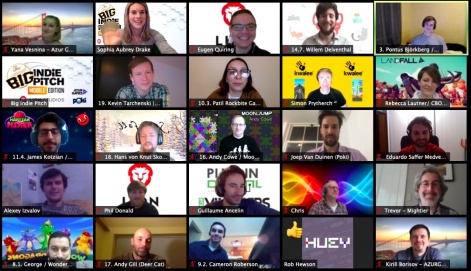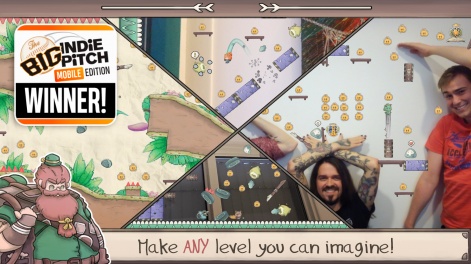The Big Indie Pitch is a regular event run by the makers of PocketGamer.biz. It sees indie developers engage in a speed-dating-style pitching competition for fame and those sweet, sweet promotional packages.
The event gives indies four minutes to pitch their games to a panel of press, publishers, and industry pundits. The judges then pick three winners and everybody gets valuable feedback.
The indie view
The Big Indie Pitch is getting bigger and bigger as we bring it to events all across the world. To give you an idea of what the event is like, who attends the events and the games on show, we've sat down with a number of past BIP contestants to offer their views.

Today, we're speaking to Pontus Björkberg from Attractive Interactive, who submitted Paper Game to The Big Indie Pitch (Mobile Edition) at Pocket Gamer Connects Digital #1 and walked away as the champion of our first-ever digital pitch.
PocketGamer.biz: Tell us a little about yourself and your indie studio. Who is in the team and what are their inspirations?
Pontus Björkberg: Attractive Interactive has been around for about two and a half years and we chose the name because it rhymed, and it's hilarious. We three founders all met at university where we studied game and software engineering and one day we decided to actually use what we've learned and try to make a game. And because we were all programmers, why not make a game where the players made both the art and the level design!
Pontus
Co-founder and dreamer, programmer at heart. Inspired by challenges and possibilities, of which Paper Game has plenty.
Oscar
Co-founder and CEO. Jack of all trades, doing everything from accounting to systems programming to investor relations. Longs to build a stable business that makes games that people love.
Ivar
Co-founder and a happy programmer with 'cravings' for 'tasty' graphics! Driven by solving and improving complex programming problems and challenges.
Simon
Technical Artist. A silly moustache guy that sometimes is way too loud in the office. Working with front-end, making sure that anything from UI to gameplay feels tight and responsive! No game should be left out, feeling clunky and unresponsive!
Madison
Lead 2D Artist with a love of traditionally animated films and expansive RPG games. Solving your visual needs from world design to particle effects to animations all striving to create characters and worlds which players love just as much as I do.
Tell us about Paper Game that you pitched at the competition.
Paper Game can be described as a Mario Maker for the phone, that lets you draw your own levels on a sheet of paper and play them immediately by taking a picture. The entire game is built around turning your images into a foundation for a level, not only of drawings, but skylines, tree branches, or selfies all work. In the level editor you get to flex your design muscles by putting out traps, obstacles, and enemies to make your level awesome before you share it with the world, which is just a button press away.
What do you think are the most unique and interesting aspects of Paper Game that gamers may never have seen before?
It has to be our way of turning images into levels. It has never been so easy to start creating your own levels. You don't have to learn any tools to get started, you can take a photo of anything and seconds later start jumping around on it. This is a custom algorithm that we've been working on for three years in order to get it fast enough to run on even low-end devices, while still being powerful enough to perform well on a lot of different images.
What made you choose to focus on a game in which players have total control over the creativity?
It was the way people reacted to playing our prototype for the first time. To first show them that you can draw, and then see them start pushing the boundaries of what is possible and in the end leaving the paper all together! That's where we got our first genuine laughter, and it is the excitement that comes with that borderless creativity that we want to capture with Paper Game.
How did you come to choose the platforms that you would develop Paper Game for?
Because our game needs a camera to run, the decision to target mobile devices seemed pretty obvious. But we are also looking at expanding to more platforms once Android and iOS are up and running.
Looking at the studio a little more now. How hard is it to survive as an Indie developer?
We've been doing this for three years now, and fulltime for almost half of that. Over time what 'survival' meant changed a lot. Before we found our publisher and it was only us three founders it was all about just finding the time and energy to develop the game, and the only consequence of not doing that would be that our game would never get finished.
But after we got a publisher and expanded the team, money became more synonymous with our survival. And with no game out yet to generate revenue, we've done a lot to find alternative sources of income. And in that sense it's really hard to survive as an indie developer, because it's way easier to make money doing something else. But we get to do what we love, every day. And this makes surviving a lot easier.
Are there any tips and advice you would give to independent developers out there who are just starting out?
When I read a lot of these tips when I was starting out I found it hard to find tips I could actually follow. So I'll do my best to give advice that Pontus from three years ago would've loved to hear.
- You need two things. A prototype and a pitch (P&P), and the pitch is way more important.
- A pitch is a PowerPoint presentation with pretty pictures, not a long detailed design document. Took a whole year for someone to tell me this.
- When you have your P&P, find competitions. Not because you can win (even though that is a great bonus!), but because it gives you a great short term goal! Your P&P will get better and better, and soon you'll find yourself with something you can build a business around!
- Find help. We joined a business incubator six months after starting to work on Paper Game, and there's no way we would be where we are today if it wasn’t for them. Game development is a business, and you have to master that part as well. And with the proper help it's not that hard.
- Do the research, who are your competitors? How much time and what resources do you need to finish the game? Make a detailed plan from now until release.
- Decide what you need to move forward. Most people realize that they need money, which you can solve in multiple ways, we decided to go with the publisher/investor route. Since we felt like we needed more people to finish the game. So the rest of the tips are for those that want to go down that path as well.
- Write the best pitch you've ever written, test it on everyone, realize it wasn't as good as you thought it was. Repeat until it actually is as good as you think it is.
- Now that you've figured out what makes your game interesting, make a killer prototype that proves you have what it takes to make it, and it doesn't have to belong. Of all pitches we did we spent about 10% of our time actually playing the game.
- Find the money to go to GDC. Sitting down face to face with someone increases your odds of landing a deal by a lot, and GDC is the place with the most publishers.
- Find me there, and let's share a beer to celebrate your success!

How did you find your experience pitching as a part of the Big Indie Pitch?
I've done this twice now, and coming into it the second time I remembered what the winner last time told me, 'You don't have a lot of time to speak, so just let your game speak for itself'. So I went in with no plans of showing them a pitch deck, I just showed them the basics of the game and let them ask the questions. This led to a relaxed atmosphere and great conversation, and a few minutes felt like plenty of time!
What do you feel you have gained from the experience, and what do you still hope to gain?
This win couldn't have come at a better time, we are about to release the game and we got some great upcoming features we can't wait to share with the world. We hope this will help us build our community and lead to a ton of interesting levels!
What are your hopes for this game in the future, and do you have any plans for any future projects?
The possibilities with Paper Game are endless, and we aim for Paper Game to be played for a long time! And to keep it relevant we want to do what other games with a long shelf life do and empower the community. One of the features I’m most excited about is the fact that all obstacles and enemies in the game are powered by Lua scripts, which means it's possible for our players to create their own.
Modding is extremely popular, and Minecraft has 55 000 mods hosted on CurseForge alone. By opening up our game to modders, it makes it possible for a small studio like ours to even go past Super Mario Maker and their ~200 assets. We want to make Paper Game not only the easiest level designer to use but also the most powerful one, and we want to do that sharing everything with our community.
Want to show off your exciting new game? We host Big Indie Pitch events throughout the year, so be sure to keep an eye out on our events page for an event near you.
Upcoming Big Indie Pitch Event Pages & Registration
June 9 - The Big Indie Pitch (PC+Console Edition) at Pocket Gamer Connects Digital #2
June 10 - The Big Indie Pitch (Mobile Edition) at Pocket Gamer Connects Digital #2
July 15 - The Big Indie Pitch Digital #2 (Mobile Edition)
More coming soon so make sure to regularly check our upcoming events page here and over on BigIndiePitch.com.




















